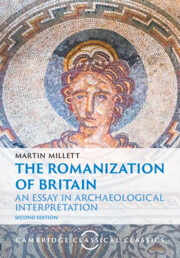Book contents
- Frontmatter
- Dedication
- Contents
- Illustrations
- Tables
- Foreword
- Preface
- Introduction: The Romanization of Britain in perspective
- 1 The Nature of Roman Imperialism
- 2 The Pattern of Later Iron Age Societies
- 3 The Invasion Strategy and Its Consequences
- 4 The Emergence of the ‘Civitates’
- 5 The Maturity of the ‘Civitates’
- 6 Development at The Periphery
- 7 The Developed Economy
- 8 Later Roman Rural Development
- 9 Epilogue: Decline and Fall?
- References
- Index
1 - The Nature of Roman Imperialism
Published online by Cambridge University Press: 02 January 2025
- Frontmatter
- Dedication
- Contents
- Illustrations
- Tables
- Foreword
- Preface
- Introduction: The Romanization of Britain in perspective
- 1 The Nature of Roman Imperialism
- 2 The Pattern of Later Iron Age Societies
- 3 The Invasion Strategy and Its Consequences
- 4 The Emergence of the ‘Civitates’
- 5 The Maturity of the ‘Civitates’
- 6 Development at The Periphery
- 7 The Developed Economy
- 8 Later Roman Rural Development
- 9 Epilogue: Decline and Fall?
- References
- Index
Summary
Well over half a century ago, Francis Haverfield (1912) discussed Romanization and defined it both in terms of historical process and material changes in native culture. These alterations were shown to have been brought about by the Roman presence and resulted in native culture more closely resembling that of Rome. Here, in attempting to evaluate these processes again, I intend to build on the foundations laid by Haverfield, but with the considerable advantage of the larger data-base for the understanding of changes in the material culture in the Empire provided by recent archaeological research. In summary, Haverfield stated: ’First, Romanization in general extinguished the distinction between Roman and provincial ... Secondly, it did not everywhere and at once destroy all traces of tribal or national sentiments or fashions’. This conclusion parallels the idea, developed by Brendel (1979), that ’Roman’ culture was by definition a cosmopolitan fusion of influences from diverse origins rather than purely the native culture of Rome itself.
- Type
- Chapter
- Information
- The Romanization of BritainAn Essay in Archaeological Interpretation, pp. 1 - 8Publisher: Cambridge University PressPrint publication year: 2025

